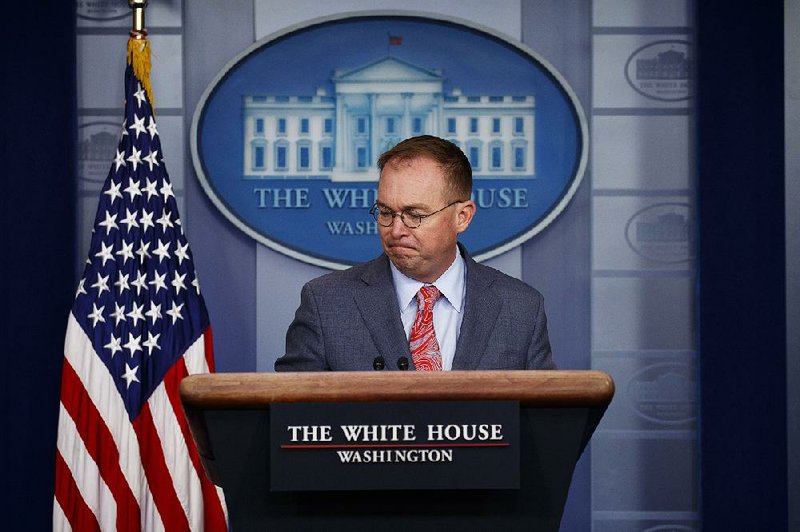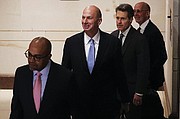WASHINGTON -- Mick Mulvaney, the acting White House chief of staff, said Thursday that President Donald Trump's administration withheld nearly $400 million in military aid in part to press Ukraine to investigate what the president has long insisted was the country's assistance to Democrats during the 2016 election.
The comment by Mulvaney undercut Trump's repeated denials of a quid pro quo that linked security aid for Ukraine's battle against Russian-backed separatists to Trump's claim that a server with missing Democratic emails was being held by a company based in Ukraine.
A former White House homeland security adviser had told Trump repeatedly that the theory had been "completely debunked." But Trump demanded Ukraine take a look, Mulvaney said.
"The look-back to what happened in 2016 certainly was part of the thing that he was worried about in corruption with that nation," Mulvaney told reporters, referring to Trump. "And that is absolutely appropriate."
He said that administration officials initially withheld the aid because "everybody knows this is a corrupt place," and the president was demanding Ukraine clean up its own government. But, Mulvaney added, "Did he also mention to me in passing the corruption related to the DNC server? Absolutely. No question about that."
[Video not showing up above? Click here to watch » https://www.youtube.com/watch?v=iQFAh_MU69E]
"But that's it," he concluded, "and that's why we held up the money."
Within hours, Mulvaney issued a separate statement claiming his remarks were misconstrued.
"Let me be clear, there was absolutely no quid pro quo between Ukrainian military aid and any investigation into the 2016 election," he said. "The president never told me to withhold any money until the Ukrainians did anything related to the server."
But House Democrats seized on Mulvaney's earlier remarks.
"The only thing I'll say at this point is that Mr. Mulvaney's acknowledgment certainly indicates that things have gone from very, very bad to much, much worse," said Rep. Adam Schiff, D-Calif., chairman of the House Intelligence Committee who is leading an impeachment inquiry focused on an alleged diplomatic campaign to pressure Ukraine to investigate former Vice President Joe Biden and his son.
Jay Sekulow, one of Trump's personal lawyers, said Thursday that "the president's legal counsel was not involved in acting Chief of Staff Mick Mulvaney's press briefing."
Democratic lawmakers saw Mulvaney's comments as support of the testimony from other witnesses, who have accused the administration of improperly pressuring Ukraine and of sidelining veteran diplomats in favor of Trump's political loyalists.
"We have a confession," said Rep. Eric Swalwell, D-Calif.
Mulvaney, who has already received a subpoena for documents in the impeachment probe, will now likely be asked by investigators to appear for a deposition.
In wide-ranging remarks, Mulvaney told reporters at the White House that the $391 million in military aid was initially withheld from Ukraine because the president was displeased that European countries were not as generous with their assistance. He also wanted more attention paid to Ukraine's persistent political corruption.
Mulvaney denied that the aid for Ukraine was also contingent on its government opening an investigation into either Biden, a Democratic candidate for president, or his younger son, Hunter Biden. Asked whether he did anything to pressure President Volodymyr Zelenskiy of Ukraine to investigate the Bidens, Mulvaney said "no."
But the president did ask Ukraine to reexamine discredited theories that Ukraine, not Russia, had worked to sway the 2016 campaign. Mulvaney's mention of a "DNC server" was a reference to a theory that Ukraine was involved in Russia's 2016 theft of emails from the Democratic National Committee and the Democratic Congressional Campaign Committee.
Mulvaney tied the server to the Justice Department's review of the origins of the Russia investigation, led by the U.S. attorney in Connecticut, John Durham, and closely overseen by Attorney General William Barr.
"That's an ongoing investigation," Mulvaney said.
But while the Justice Department said last month that Durham is examining any role that Ukraine might have played in the early stages of the Russia investigation, a department official declined Thursday to comment on whether he is examining the server theory.
Russian military officers hacked Democratic servers to steal thousands of emails in 2016, the intelligence community and the special counsel found, and no one has uncovered evidence of Ukrainian involvement.
Mulvaney said the president had done nothing improper and had stayed within normal diplomatic channels. He blasted the current and former administration officials who have testified in the impeachment inquiry, describing them as personally opposed to the changes in foreign policy that Trump had put in place.
"What you're seeing now, I believe, is a group of mostly career bureaucrats who are saying, 'you know what, I don't like President Trump's politics, so I'm going to participate in this witch hunt that they are undertaking on the Hill.'"
AMBASSADOR TESTIFIES
Mulvaney made his remarks on the same day that Gordon Sondland, the ambassador to the European Union and a wealthy donor to Trump's campaign, told lawmakers that Trump had delegated Ukraine policy to his personal lawyer Rudy Giuliani.
"I would not have recommended that Mr. Giuliani or any private citizen be involved in these foreign policy matters," Sondland said, according to his prepared remarks.
Mulvaney, in his comments, said there is nothing wrong with Trump relying on Giuliani or others outside of the diplomatic corps to conduct foreign policy.
"That's the president's call," he said. "You may not like the fact that Giuliani was involved. That's great, that's fine. It's not illegal, it's not impeachable." He added: "The president gets to set foreign policy and he gets to choose who to do so."
Sondland testified privately for more than six hours at the Capitol, the latest in a series of current and former diplomats and White House aides who have provided detailed accounts of actions by Giuliani and others related to Ukraine.
Sondland, who has become a focus of the impeachment inquiry due to his outsize role in U.S.-Ukraine policy, criticized the president's temporary hold on aid and the recall of Marie Yovanovitch, the former U.S. ambassador to Ukraine. Sondland called her an "excellent diplomat" and said he "regretted" her departure, which followed a campaign by Giuliani to paint her as disloyal to the president.
Sondland said that in principle he opposes any "quid pro quo" that would exchange U.S. support to a friendly nation for an investigation into the Bidens.
But he said he became aware only recently that Trump's efforts to investigate the Ukrainian energy company Burisma were due to its associations with Biden, whose son Hunter sat on its board.
"I did not understand, until much later, that Mr. Giuliani's agenda might have also included an effort to prompt the Ukrainians to investigate Vice President Biden or his son or to involve Ukrainians, directly or indirectly, in the president's 2020 re-election campaign," he said, explaining that he "understood that Burisma was one of many examples of Ukrainian companies run by oligarchs and lacking the type of corporate governance structures found in Western companies."
"Let me state clearly: Inviting a foreign government to undertake investigations for the purpose of influencing an upcoming U.S. election would be wrong," Sondland said. "Withholding foreign aid in order to pressure a foreign government to take such steps would be wrong. I did not and would not ever participate in such undertakings."
But that testimony appears to conflict with what other current and former Trump administration officials told House investigators over the past two weeks. Fiona Hill, the National Security Council's former senior director for Russia and Europe, told House investigators that she was concerned by Sondland's talk of investigations in a July meeting, concerns she eventually relayed to a lawyer for the National Security Council.
And George Kent, deputy assistant secretary of state for Europe and Eurasia, testified that Sondland was deputized, along with former special U.S. envoy to Ukraine Kurt Volker and Energy Secretary Rick Perry, as one of "three amigos" running Ukraine policy. The move came during a May meeting that Mulvaney organized after Yovanovitch's ouster.
Last week, Volker provided impeachment investigators with text messages showing that Sondland had said Trump, before agreeing to meet in person with his Ukrainian counterpart, wanted the "deliverable" of a promise from Zelenskiy to investigate Burisma and the 2016 election.
Sondland said his pursuit of investigations in Ukraine were always in line with long-standing U.S. policy to push for transparency and anti-corruption efforts in the country. He added that he was never aware of objections to the plans for Ukraine policy from Hill or her boss, national security adviser John Bolton. Hill testified Monday that Bolton was livid that Giuliani was directing a shadow Ukraine policy.
"I have to view her testimony -- if the media reports are accurate -- as the product of hindsight and in the context of the widely known tensions between the [National Security Council], on the one hand, and the State Department, on the other hand," Sondland said.
Information for this article was contributed by Michael D. Shear of The New York Times; by Karoun Demirjian, John Hudson, Josh Dawsey, Matt Zapotosky and Carol D. Leonnig of The Washington Post; and by Eric Tucker, Mary Clare Jalonick, Lisa Mascaro, Mike Balsamo and Darlene Superville of The Associated Press.
A Section on 10/18/2019


